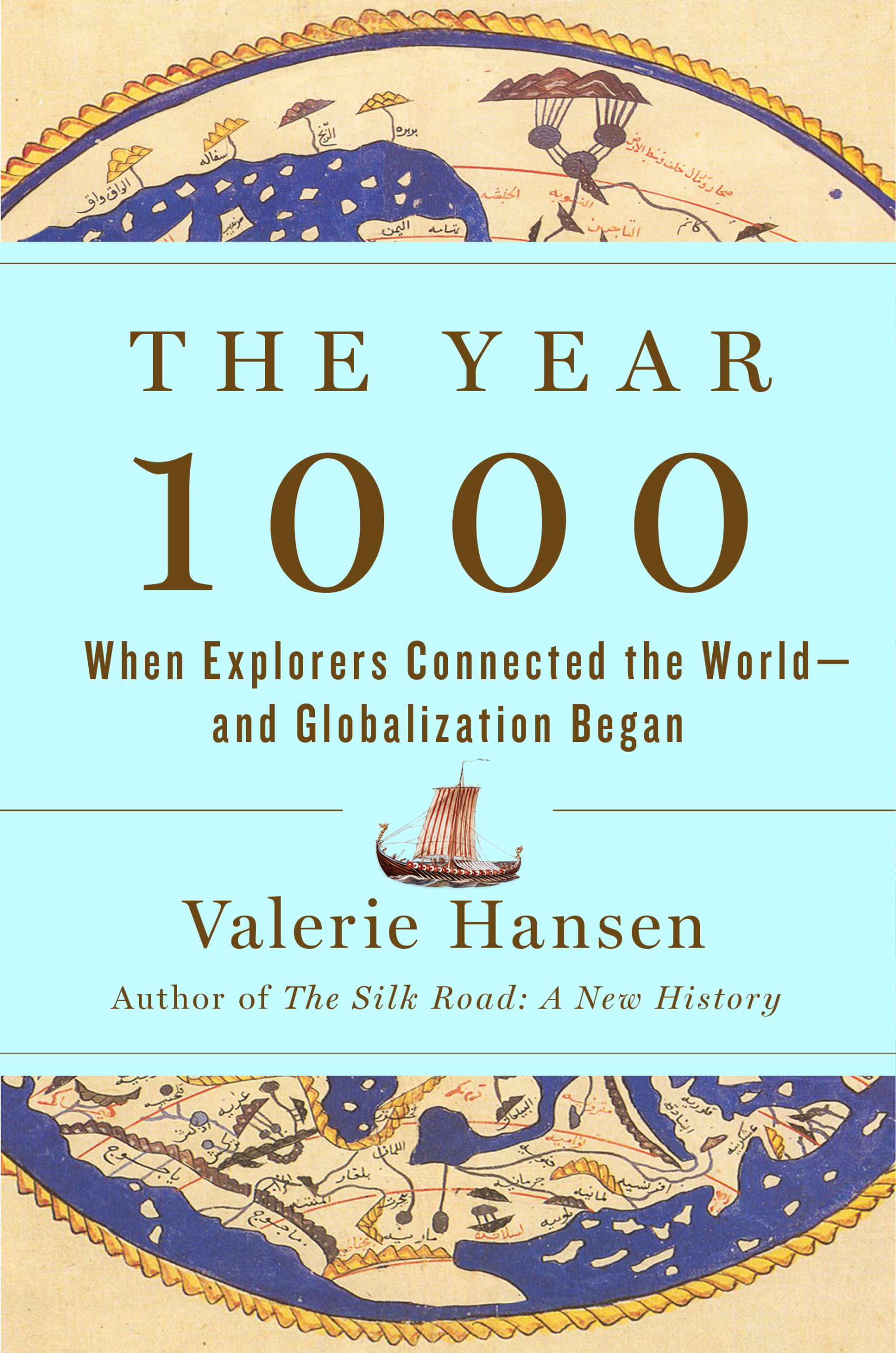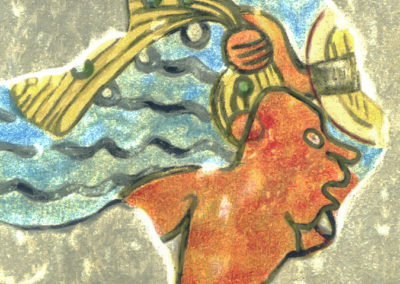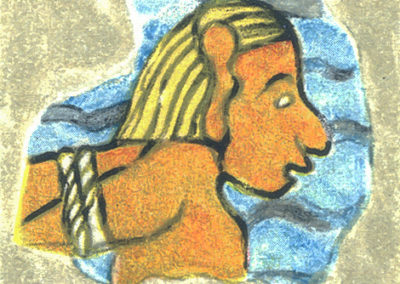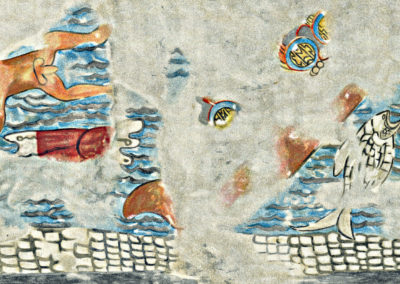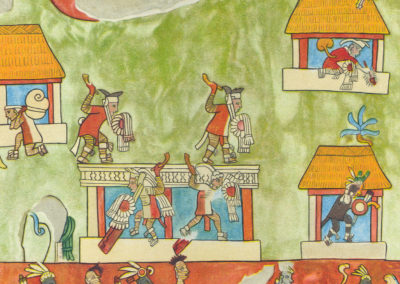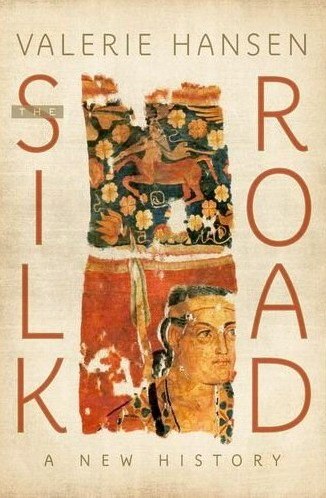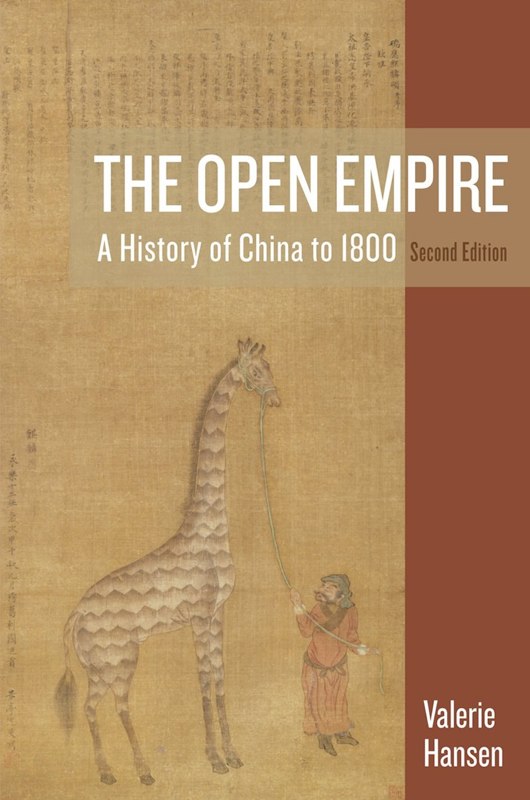By Valerie Hansen
The Year 1000
When Explorers Connected the World — and Globalization Began
Valerie Hansen, an award-winning historian, argues that the year 1000 was the world’s first point of major cultural exchange and exploration. Drawing on nearly thirty years of research, she presents a compelling account of first encounters between disparate societies, which sparked conflict and collaboration eerily reminiscent of our contemporary moment.
“Fascinating … [a] highly impressive, deeply researched, lively and imaginative work.”
Captive Vikings?
Ann Axtell Morris’s watercolor in Earl Halstead Morris, The Temple of the Warriors at Chichen Itza, Yucutan (1931): volume II, plate 147b.
Captive Vikings?
Ann Axtell Morris’s watercolor in Earl Halstead Morris, The Temple of the Warriors at Chichen Itza, Yucutan (1931): volume II, plate 147c.
Maya Battle Scene
Ann Axtell Morris’s watercolor in Earl Halstead Morris, The Temple of the Warriors at Chichen Itza, Yucutan (Carnegie Institution of Washington, 1931): volume II, plate 139.
“The myth of the ‘European Middle Ages’ dissolves in the ocean currents and trade winds of this stimulating account of early global connections. Bolstered by facts and enlivened by intriguing theories, Hansen’s book presents a world of objects, ideas, people, animals, and know-how constantly on the move. A brisk and refreshing trip for us all.
— Barbara H. Rosenwein, author of A Short History of the Middle Ages and Generations of Feeling
Valerie Hansen’s The Year 1000 is a whole new way of looking at the world. If you have the idea that medieval history was a time when there were few connections between those who inhabited different places on the map, this book will reorient you in the most stimulating way possible. Hansen brilliantly shows that in that long-ago newly globalized world the flow of crops, religion, slaves—and more—influenced societies as far apart as Africa and central America.
— Rana Mitter, author of the internationally bestselling Forgotten Ally
Vivid and edifying… [Hansen] displays a remarkable lightness of touch while stuffing the book full of fascinating details, and easily toggles between the big picture and local affairs. This astonishingly comprehensive account casts world history in a brilliant new light.
— Publishers Weekly (starred review)
Valerie Hansen has not only fashioned a coherent and original vision of the world in the year 1000, in itself a remarkable feat of scholarship, but described it in a clear, concrete and absorbing narrative that will entertain and enlighten every reader.
— R.I. Moore, author of The First European Revolution and The War on Heresy
Elegantly written and meticulously researched, The Year 1000 will take you on a whirlwind world tour that challenges the notion of a more recently hyper-connected globe. A must read for anyone wishing to understand the millennia-old roots of globalization.
— Sarah Parcak, author of Archaeology from Space: How the Future Shapes Our Past
[Displays] the author’s unique fusion of firsthand, on-site investigations around the world and intensive research in far-flung libraries, archives, and museums. What’s more, all of this energetic, scholarly activity is combined with a compelling argument for a new hypothesis concerning the origins of globalization, a topic that could hardly be more pertinent to our own age.
— Victor H. Mair, editor of The Columbia History of Chinese Literature
Sweeping across the world from China to East Africa, Newfoundland to Yucatan, and Angkor Wat to Tikal, Valerie Hansen’s story of the movement of peoples, products, religions, and ideas around the year 1000 makes it clear that globalization is nothing new, and that the civilizations open to the challenges of the unfamiliar were the ones that flourished. No one has told this story better or has been able to combine the latest scholarly research with such an exciting and accessible narrative. This is how world history should be written.
— Stuart B. Schwartz, author of All Can Be Saved: Religious Tolerance and Salvation in the Iberian Atlantic World
Hansen takes us on an epic journey with seafarers, traders and pilgrims, women and men, across the globe some 1000 years ago. A bold and entertaining story, and ultimately, a celebration of difference—and readiness—for the unfamiliar.
— Arezou Azad, Senior Research Fellow at the University of Oxford and Humboldt Fellow at the Freie University of Berlin
An absorbing read that makes a distant world feel near.
— Francesca Trivellato, Andrew W. Mellon Professor of History at Princeton’s Institute for Advanced Study, and author of The Familiarity of Strangers
Valerie Hansen takes us on an informative and entertaining romp around the world of a thousand years ago, on everything from Viking longboats to camel caravans in Central Asia. Anyone who thinks that globalization is something new in life needs to read this book!
— Ian Morris, author of Why the West Rules—for Now
In a feat of remarkable synthesis, Valerie Hansen leads us across African empires and Mesoamerican exchanges, along the Silk Road to Europe, and aboard ship with the multiethnic mariners of the Indian Ocean and the Vikings who followed the Volga to Byzantium. More than a history of global trade, this is a story of human encounters brought to life by vignettes and voices from every corner of a connected medieval planet.
— Nile Green, author of Sufism: A Global History
Valerie Hansen’s “The Year 1000″ is a whole new way of looking at the world. If you have the idea that medieval history was a time when there were few connections between those who inhabited different places on the map, this book will reorient you in the most stimulating way possible. Hansen brilliantly shows that in that long-ago newly globalized world the flow of crops, religion, slaves—and more—influenced societies as far apart as Africa and central America.
— Rana Mitter, author of the internationally bestselling Forgotten Ally
Valerie Hansen’s sweeping tour of the world in the year 1000 is revelatory and full of eye opening surprises. She tells a rich and fascinating story of the many ways that far-flung societies a millennium ago forged connections among themselves, a reminder that the forces of globalization that seem so potent today have been at work for centuries. A masterly work of scholarship.
Drawing on cutting-edge archaeological research from the Americas, Africa, Asia and Europe, Hansen offers a highly readable account of the forging of global connections long before Columbus. Her suggestion that the quickening and thickening of communication has always brought challenges as well as opportunities is particularly valuable at a time when we struggle with the implications of modern globalization.
— Catherine Holmes and Naomi Standen, Editors, The Global Middle Ages
An exhilarating ride…A lens to examine the arc of world cultures at a salient moment in human history, when men and women crossed westward across the stormy Atlantic and met their counterparts on the American continent.
— William Goetzmann, author of Money Changes Everything: How Finance Made Civilization Possible
The Year 1000 takes readers on a worldwide adventure, joining fleets and caravans as they explore a remarkably globalized world….A lively read filled with surprises, The Year 1000 speaks to our globalized present in ways well worth heeding.
— Joanne B. Freeman, author of Affairs of Honor and The Field of Blood
In a rich and fascinating account of the world around the year 1000, Valerie Hansen shows how people, goods, and ideas traversed vast spaces. Ranging by sea and land across six continents, she seeks out exciting and unexpected connections, showing that globalization is by no means new to our own time.
— David Abulafia, author of The Discovery of Mankind and The Great Sea
Hansen teases out the unfamiliar links between Chinese markets, Baghdad fortunes, strange blonds on the walls of Maya temples, and Vikings on Russian rivers in a careful but accessible and truly global history.
— Michael Pye, author of The Edge of the World
Timely proof that globalization has a point of origin and a long history….[Hansen] offers in three hundred vivid pages the kind of deep texture that makes an age come alive.
— Paul Freedman, author of Out of the East: Spices and the Medieval Imagination
Other Books
The Silk Road
This book explains how this very modest commercial artery became the world’s most famous cultural superhighway.
The Open Empire
Drawing on unconventional sources —archeological sites, paintings, and fiction —The Open Empire argues that China remained open to outside influences throughout its long history.
